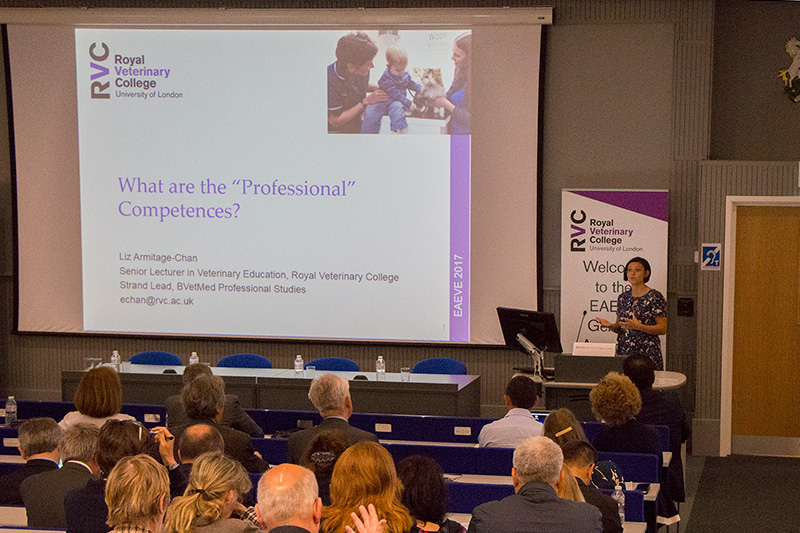Supporting students to feel confident as important as clinical skills
When imagining a veterinary career, most probably picture themselves looking after cute animals or delivering front-line conservation in Safari parks.
However, there are many other elements central to most veterinary jobs that are less well publicised but vital to the role. Veterinarians are often presented with complex decisions and work in challenging environments.
Managing the challenges of working environments, including clients’ emotions, financial limitations, heavy workloads, and complex caseloads are all things that veterinarians deal with on a daily basis. It is important that veterinary students feel confident and competent in professional problem-solving, according to Liz Armitage-Chan, a Senior Lecturer in Veterinary Education and a tutor on the Veterinary Education postgraduate programme at the RVC.
Ms Armitage-Chan was one of the speakers at the recent European Association of Establishments for Veterinary Education (EAEVE) Educational Symposium, which was held at the RVC for the first time, where she joined speakers from around the world.

Ms Armitage-Chan delivered a presentation called “What are the Professional Competencies?” which included her contemporary take on the outcome competencies of the veterinary graduate, and an overview of the teaching and assessment strategies she has put in place at the RVC.
Ms Armitage-Chan’s involvement with the veterinary professional skills teaching started in 2013 when she re-joined the RVC as part of LIVE (Lifelong, Independent Veterinary Education), a Centre for Excellence in Teaching and Learning (CETL). Feeling that the curriculum needed a clearer focus, she began researching the professional identities of experienced and inexperienced vets. “Identity research explores those aspects of our selves that makes us “us” and all groups identified the same things as being important to them: that being a vet involves complex decisions, which incorporate the client’s needs and those of the business, on top of the veterinarian’s priorities relating to animal welfare and the treatment of disease”.
“All groups also demonstrated that managing the challenges of their work was an important part of the vet’s role. What we did not expect to find was that those vets who can shape their notions of career success on these elements of the veterinary identity appear to demonstrate better mental wellbeing, and cope better with the demands and stresses of veterinary life”, she said.
In response to these findings, the RVC shaped its previous professional skills strand into a professional identity programme. “We aim to support our students in feeling confident and competent at professional problem-solving: placing their skills in clinical reasoning alongside those necessary for wider decision-making, balancing the needs and wishes of the client, the business, colleagues and the profession, and making a decision that may be perceived as imperfect to one or more of these stakeholders”.
“Our students are often reluctant to see that there is not a solution that is perfect for all. Most importantly, by guiding the students to contextualise the taught course during their extra-mural studies, they are encouraged to see the veterinary identity in this way, such that career goals of successfully diagnosing and treating their patients are coupled with valuing occasions in which they have helped a client through a difficult decision”, she said.
Ms Armitage-Chan believes that helping students to value the client and colleague relationship offers the potential for graduates to have higher levels of career satisfaction and to feel successful in their early careers. This helps contribute to staff retention.
The RVC continue to expand further on their approach to curriculum design in a recent paper, which they hope will become a reference point for curriculum design across the world.
Research References
- E Armitage-Chan, J Maddison, SA May 2016. What is the veterinary professional identity? Preliminary findings from web-based continuing professional development in veterinary professionalism. Veterinary Record 178 (13), 318.
- E Armitage-Chan 2017. Identity, Environment and Mental Wellbeing. Royal College of Veterinary Surgeons Mind Matters Conference, Edinburgh, January 2017. Available at: The First Mind Matters Initiative Research symposium
- E Armitage-Chan, SA May, in press. Developing a professional studies curriculum to support veterinary professional identity formation. Journal of Veterinary Medical Education.
The Veterinary Education programme
The Veterinary Education programme is unique and offers five separate courses. Students can opt to begin and end their studies at a point that suits their previous experience, qualifications and career aspirations and can study the course globally via distance learning or face to face.
For further information see MSc in Veterinary Education or email mscvetedu@rvc.ac.uk.
Press Office Contact
Uche Graves / Zoe Chadwick
T: 0800 368 9520
E: uche.graves@plmr.co.uk / zoe.chadwick@plmr.co.uk
Notes to Editors
The Royal Veterinary College (RVC) is the UK's largest and longest established independent veterinary school and is a constituent College of the University of London. The RVC offers undergraduate, postgraduate and CPD programmes in veterinary medicine, veterinary nursing and biological sciences, being ranked in the top 10 universities nationally for biosciences degrees. It is currently the only veterinary school in the world to hold full accreditation from AVMA, EAEVE, RCVS and AVBC.
A research-led institution, in the most recent Research Excellence Framework (REF2014) the RVC maintained its position as the top HEFCE funded veterinary focused research institution.
The RVC also provides animal owners and the veterinary profession with access to expert veterinary care and advice through its teaching hospitals; the Beaumont Sainsbury Animal Hospital in central London, the Queen Mother Hospital for Animals (Europe's largest small animal referral centre), the Equine Referral Hospital, and the Farm Animal Clinical Centre located at the Hertfordshire campus.
RVC Press Release 25 May 2017
See other Press Releases.

